ANNUAL SUMMIT
DIPLOMACY AND HUMAN RIGHTS EDUCATION SUMMIT 2020
The US Institute of Diplomacy and Human Rights (USIDHR) hosted their annual Summit on Diplomacy and Human Rights Education on November 16th -18th , 2020 . This internationally oriented event had a successful line-up of 10 guest speakers from 5 continents with various professional backgrounds, and whose passion and dedication for human rights and advocacy and citizen diplomacy reached and inspired a global audience.
With all your help and commitment, we are proud to announce that we managed to create a global chain of solidarity, cultural understanding, tolerance and harmony, in which participants from over 39 countries tuned in and actively engaged in talks with our distinguished speakers, who shared their expertise and extensive knowledge on key topics, Freedom of Religion or Belief, Human Rights Education and Citizen Diplomacy.
The event was streamed live over different platforms such as Zoom and Facebook Live on USIDHR’s Official Facebook page. Overall, the Summit gathered over 600 participants with more than 10,000 people watching the live stream over the course of the 3 days. International Human Rights Law Specialist, Ms. Isabelle Vladoiu, Founder of USIDHR, acted as the host and moderator throughout the summit and Q&A sessions.
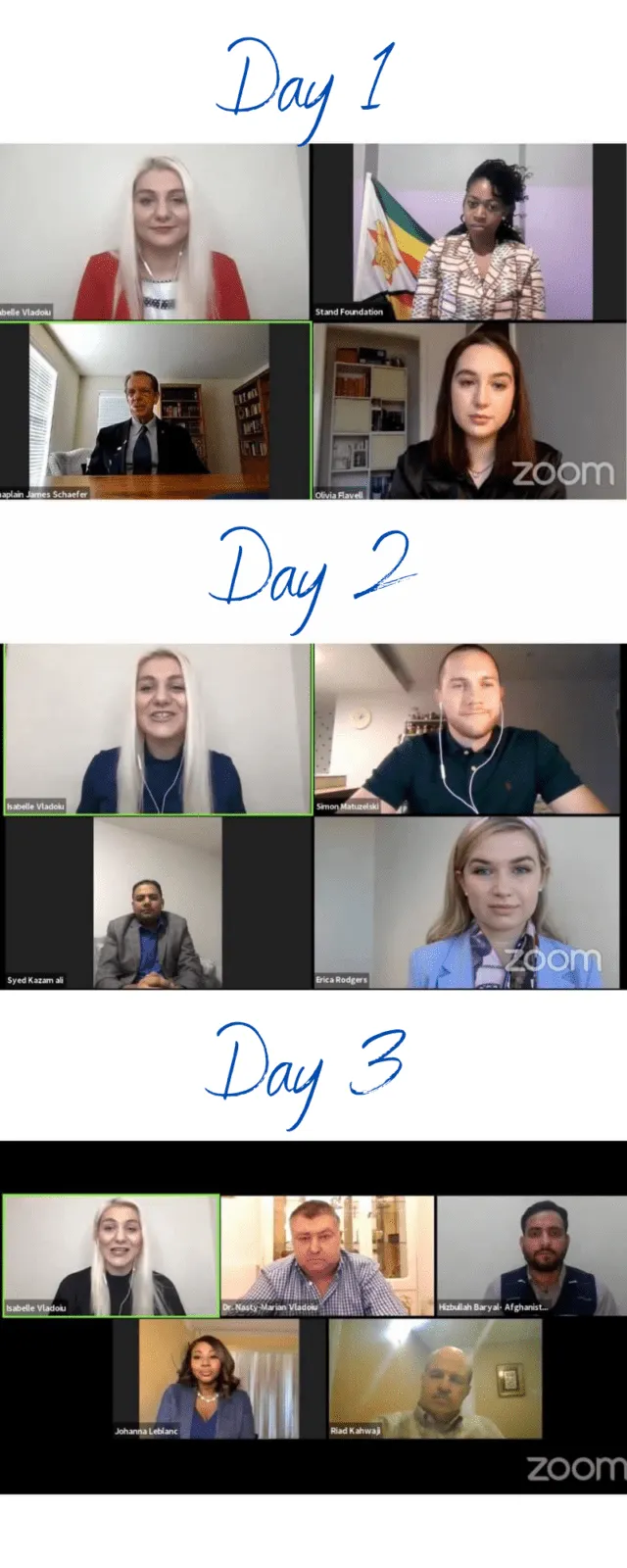
DIPLOMACY AND HUMAN RIGHTS SUMMIT
DAY 1: Religious Freedom or Belief
To celebrate the International Day for Tolerance, speakers from Zimbabwe, the United States of America, and the United Kingdom were invited to expand on the topic of religious freedom and raise awareness on the dangers of religious intolerance by giving real-life examples. They discussed the situation of religious minorities and how we can all support them in order to achieve mutual understanding for all.
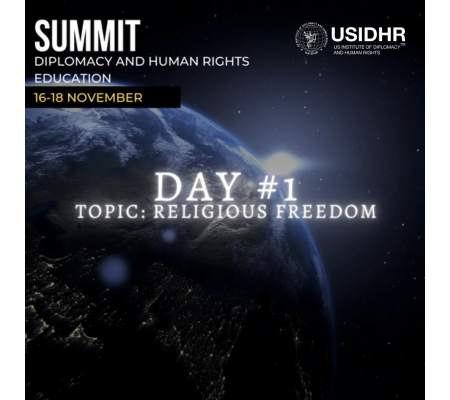
DIPLOMACY AND HUMAN RIGHTS SUMMIT
Day 1 Highlights
Chaplain James E. Schaeffer (United States) - U.S. Department of State, Office of International Religious Freedom and the Under Secretary for Civilian Security, Democracy and Human Rights.
“Religious freedom allows the striving for [the] good that is inside of us and that [thing] inside of us is called faith - but faith is not passive, it is active.”
Charlene Checkenya (Zimbabwe) - Founder Stand Foundation Trust; Women and Girls Rights Advocate; Mandela Washington Fellow 2017
“In as much as we endeavour to promote the freedom of religion and tolerance in this day, it is equally important to investigate harmful practices in the religious belief systems.”
Olivia Flavell (United Kingdom) - Senior Research Associate, US Institute of Diplomacy and Human Rights
“The only thing that we can do is to ensure we put pressure on our own governments and start from the bottom and work all the way up to make sure that some of these injustices are widespread and that people do know that it’s happening so that the people at the top can help and can stop atrocities like this [Uyghurs Genocide] from going on and happening again.”
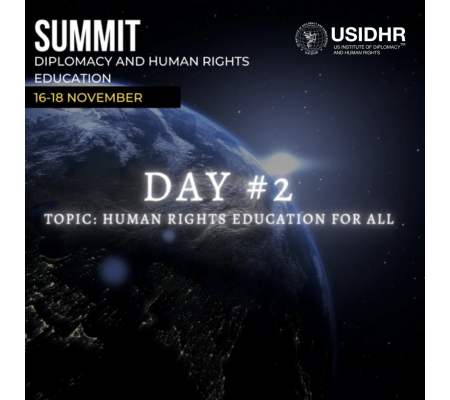
DIPLOMACY AND HUMAN RIGHTS SUMMIT
DAY 2: Human Rights Education For All
The second day of the Summit was dedicated to emphasizing the importance of human rights education. A line-up of speakers representing three layers of society and viewpoints from civil society advocacy, to private-legal, and civil service backgrounds joined us from Australia, the United States and Pakistan. They presented their opinion on the importance of educating others about their human rights and shared their experience on the subject matter and personal stories about actual cases where human rights education made a difference.
DIPLOMACY AND HUMAN RIGHTS SUMMIT
Day 2 Highlights
Simon Matuzelski (Australia) - Senior Policy Officer, Justice and Community Safety Directorate – Government of the Australian Capital Territory
“One of the big goals of human rights education is [people need] to become aware of their human rights but also become aware of us being part of a larger global system, where our views and our beliefs are just as equal to someone else’s views and beliefs.”
Erica Rodgers (United States) –Human Rights Expert; Former National Director, Youth for Human Rights International; Public Relations Manager, EMR Public Relations
“When you educate someone about their human rights, it empowers them to take responsibility for their life, to take responsibility for their community, and you truly cannot protect your own human rights if you do not know them.”
Syed Kazim Ali (Pakistan) – Attorney, Lahore High Court; Chair of the Human Rights Protection Committee, Lahore High Court Bar Association
On the question “How to reach out to countries where freedom of speech is limited?”: “We need to network with the students all over the world, we need to generate a network with the students community in the schools and the universities [...] For example, we published a newsletter and we distributed around 20 thousand copies about human rights education in civil society, in schools and in colleges.”
DIPLOMACY AND HUMAN RIGHTS SUMMIT
DAY 3: Citizen Diplomacy 101
The final day of the summit focused on Citizen Diplomacy and its importance in portraying the cultural values of each country. Speakers from Romania, the United States, Afghanistan, and the United Arab Emirates explained the responsibility of citizens to engage across cultures and create shared understanding through meaningful person-to-person interactions. They shared personal experiences and perspectives on Citizen Diplomacy, official diplomats’ true purpose, and diplomacy as an everyday set of skills.
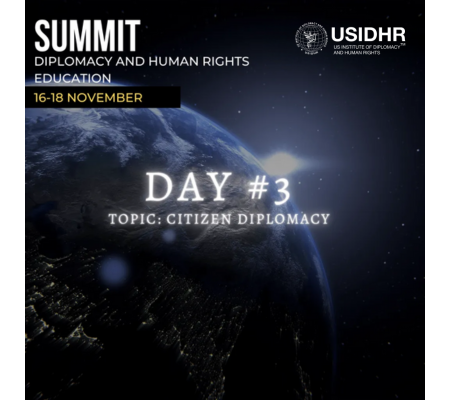
DIPLOMACY AND HUMAN RIGHTS SUMMIT
Day 3 Highlights
Prof. Dr. Nasty-Marian Vladoiu (Romania) - Professor of International Law, University of Transylvania; Director, Center for Legal and Diplomatic Studies; Chairman, International Union of Bilateral Chambers of Commerce and Industry
“Because of the informational society which is nowadays in its full development, this mutation of peer-to-peer [diplomacy] and the change of paradigm of the entire public diplomacy [allows us] to discuss about the foreign image of the states, how we can create a good image in front of other countries and how we can sell our image from the interior side of the state.”
Johanna Leblanc (United States) - National Security Law & Foreign Policy Specialist; Senior Advisor to Foreign Government
“Diplomacy again, I cannot emphasize enough the importance of having such skills and how it could promote bilateral relations, strengthen bilateral relations and also strengthen trade relations amongst countries and create more peace and more harmony in the world. Diplomacy is a skill that everybody should have regardless of what you do for a living.”
Hizbullah Baryal (Afghanistan) - International Labour Organization (ILO) Afghanistan Office; Country Coordinator, UN Conference on Trade and Development (UNCTAD); Founder of Youth for Change and Development Organization
“Young people can play a vital role in shaping their community towards positive change. They have the power of change - Young people need to be part of sustainable development goals to discuss and dialogue on the national, regional, and global issues for the development of their countries and communities.”
Riad Kahwaji (United Arab Emirates) - Middle East Security and Defense Analyst; Journalist; Chief Executive, SEGMA
“Young students have a weapon that I did not have [their phones]. This is the weapon that youth need to use. When you see something you voice your opinion. This is how you become a game changer, this is how you can make an impact.”
Feedback from participants
“As a young law student, this summit seemed to me a special opportunity to open my horizons on concrete topics, useful in the field for which I am preparing. I learned a lot of information about what truly means the importance of human rights, the concept, the key skills of diplomacy and how important and wide is this subject. In the 21th century we need to be aware and to understand these topics from people with experience because society is in a continuous evolution and needs people with initiative. Thank you for this amazing opportunity! Congrats for an amazing job!”
“I enjoyed the idea of being all different. It is nice to meet people who speak up your own opinions. I confirmed my knowledge about these subjects and I know that from now tolerance is for me something more special and important.”
“It was a productive, educational and full of useful information summit and I am glad that I heard and learned about a topic that I am very interested in, considering the fact that I would like to practice Constitutional law and Human Rights Law after I graduate from law school. Also, I learned a lot of things about religion, religious conflicts and how human rights are seen and treated around the globe.”
“The summit was a great opportunity for me to learn the power of education on Human right, to raise awareness of people and the call to advocate and serve at the highest level as a powerful diplomat of human rights advocacy.”
“Religion can be a great tool in bringing people together and resolving conflicts and if you are aware of your human rights, it is important to educate others.”
“The summit was an amazing one. It was a whole new experience, which was partly a consequence of the colourful selection of the speakers.”
“I really liked the speakers and the things they said to us. I learned a lot about what is happening in the world. I enjoyed the first summit – the one about Religion – and the speaker from Zimbabwe who told us about their country. One more thing – I think it was very useful the presentation made by the UK speaker about China.”
“I think all the speakers had such inspirational speeches and they boosted us to meditate about things we maybe haven’t thought about before; also, I learned a lot of new things, like international events, facts I haven’t knew before, related to religious oppression, for example and also new ideas about youth activism.”
“I think this Summit helped me to understand the differences between countries across the globe when it comes to matters such as religion, diplomacy and the way human rights are approached in certain countries. For me, being a portuguese spectator, it was very interesting.”
“I liked the new ideology and vision of people related to human rights & Diplomacy. The news channels are sharing such fabricated content but this summit has really given a new dimension to thoughts of laymen. “Yes, I learnt how to be a citizen diplomat from Madam Johanna Leblanc… And also the step to follow to become a diplomat, and the work of a diplomat.I was also motivated by her presentations, she has really inspired me….I was also educated on what is happening in China by Madam Olivia. Thank you.”
“The summit of human rights and diplomacy was incredible and informative, and that was my great experience. I learn loads of beneficial things regarding diplomacy and human rights to highlight some essentials of them. I understand how we become great diplomats in our country. Moreover, how we protect and promote human rights. In addition, one of the important things that I know is that the importance of volunteerism for becoming more involved in our community and becoming a great diplomat.”
© 2025 US Institute of Diplomacy and Human Rights is a 501(c)(3) organization. Gifts are deductible to the full extent allowable under IRS regulations.
